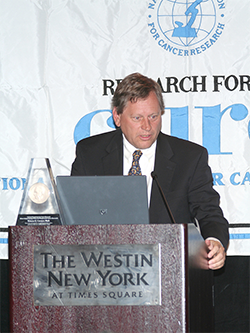2007 Prize: Webster K. Cavenee, Ph.D.
View Photos from the 2007 Ceremony
Keynote Speaker: David Allan, President and Chief Executive Officer, YM Biosciences
Director, Ludwig Institute for Cancer Research, Distinguished Professor, University of California, San Diego, Member of the National Academy of Sciences and the Institute of Medicine of the National Academies
The Albert Szent-Györgyi Prize Committee selected Dr. Cavenee for his seminal discoveries in the genetic mechanisms of human cancer. Specifically, his research provided the first evidence for the existence of tumor suppressor genes, one of the most influential breakthroughs in cancer research.
Dr. Cavenee’s original research began in on defining the genetic lesions in retinoblastoma. As a result, his efforts led to the first hard experimental evidence for the existence of tumor suppressor genes. His revolutionary research on tumor suppressor genes also confirmed the “two-hit hypothesis,” fundamentally changing the conceptual framework on cancer initiation and progression. Today, mutations of tumor suppressor genes have been identified in more than half of all tumors, including those of muscle, melanocytes, kidney, prostate, and breast. Novel gene therapies to reverse gene mutations or their effects in cancer cells hold promise as cancer treatment strategies which could be beneficial to cancer patients.
Today, Dr. Cavenee, is the Director of the Ludwig Institute for Cancer Research based at the University of California, San Diego and a Professor of Medicine in the cancer biology program at UCSD. He is a Fellow of the National Foundation for Cancer Research and has won many awards, including the Charles S. Mott Prize of the General Motors Cancer Research Foundation. He is a member of the National Academy of Sciences, Past-President of the American Association for Cancer Research, a Fellow of the American Academy of Microbiology, and serves on the editorial boards of several leading scientific journals. He has also served on the Board of Scientific Counselors of the National Cancer Institute and the National Institute of Environmental Health Sciences. Cavenee received his Ph.D. from the University of Kansas Medical School.











